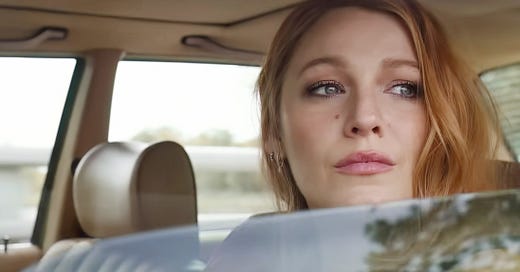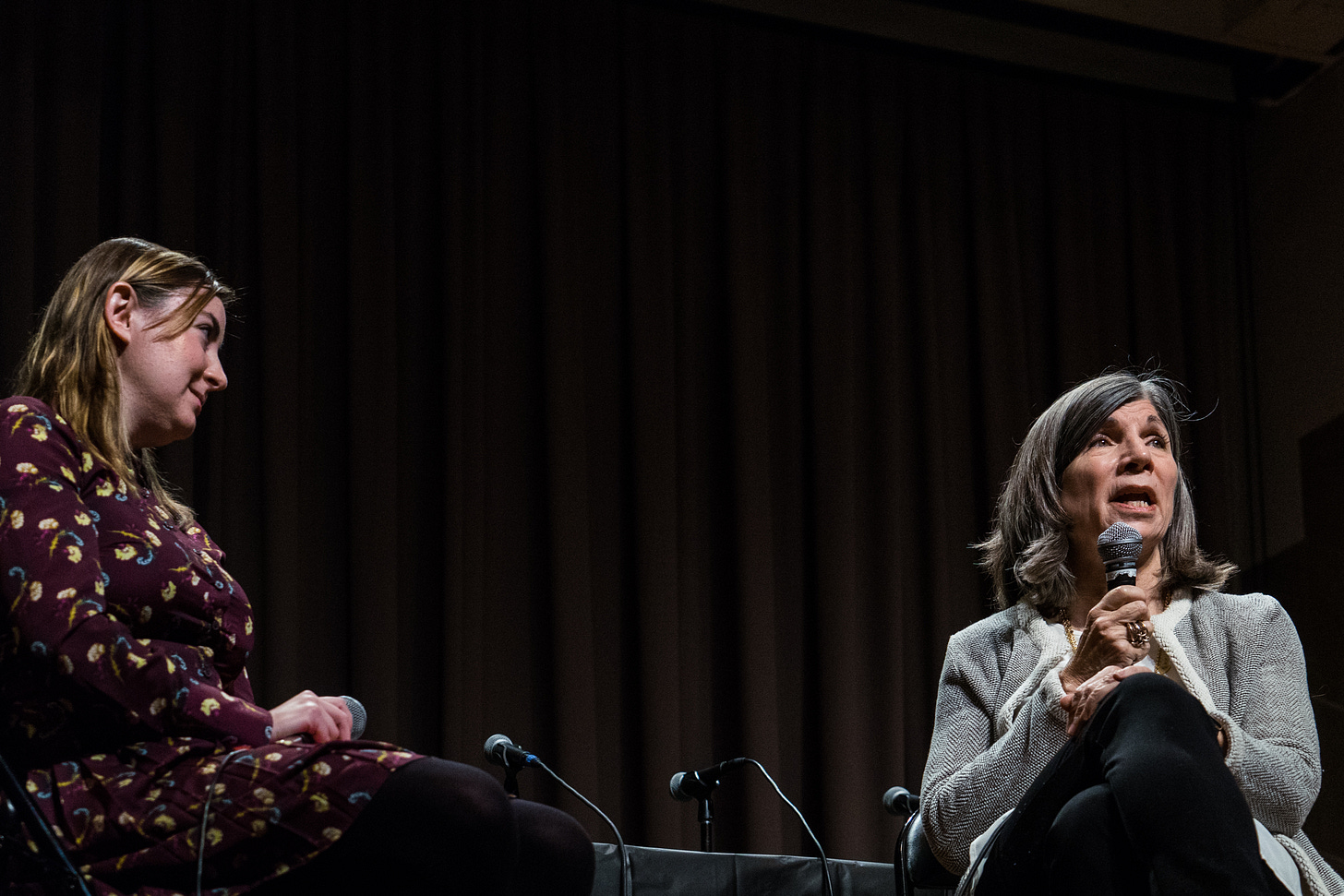Here’s something Colleen Hoover and I have in common: in August 2016, we both published books about domestic abuse. Hers was a novel titled It Ends with Us and mine was a memoir, Land of Enchantment.
It Ends with Us sold 36,000 copies its first year and has sold 10 million copies to date, Atria announced this week. Land of Enchantment sold 1,400 copies and is now out of print.
Why is It Ends with Us so popular? There are a number of reasons: Colleen Hoover has spent years building a devoted fanbase; her books went viral on BookTok during the pandemic; the film adaptation of It Ends with Us sold an additional 800,000 copies.
But I think we can attribute some of the book’s success to the fact that she took a disturbing subject that most people don’t even want to think about and turned it into an entertaining story, with a triumphant ending.
Investigative journalist Rachel Louise Snyder’s critically acclaimed, award-winning book No Visible Bruises: What We Don’t Know about Domestic Violence Can Kill Us appeared on many “best of” lists in 2019. I heard about Snyder’s book as soon as it came out and felt I “should” read it. By all accounts, it’s an important book about a subject that I know intimately. I couldn’t read it. I haven’t read it. I don’t know if I can ever read it.
No Visible Bruises has 7,500 ratings on Goodreads. It Ends with Us has 3,813,728.
In October 2016, I moderated a conversation with Anna Quindlen. She asked me about Land of Enchantment and I asked her about her 1998 novel Black and Blue, about a woman who escapes her violent husband thanks to an underground network of women helping other women start over with fresh identities.
Anna said that women came up to her at book events and in a whisper asked her where they could learn more about the underground network.
Colleen Hoover and Anna Quindlen took a question that makes us deeply uncomfortable—why would she stay with him?—and explored it through their imaginations, instead of reporting, or personal narrative.
“When I decided to write this story, I first asked my mother for permission,” Hoover writes at the end of the novel in an author’s note. “I told her I wanted to write it for women like her. I also wanted to write it for all the people who didn’t quite understand women like her. I was one of those people.”
Are you writing a memoir about something you wish more people understood?
Is memoir the best vehicle for delivering your story to a wide audience?
On Friday, I asked Mackenzie to unpack the line “memoir is tougher to sell than ever before,” which I’ve heard for at least 10 years. She defined “memoir plus” for us and said that the most viable projects today combine an incredible true story, original reporting or research, and a novelist’s gift for storytelling.
The bar is so high because the audience is so small. See for yourself, by answering these questions:
How many memoirs have you read this year?
How many memoirs released this year (2024) have you bought?
I just checked my own spreadsheet of books read; so far this year, I’ve read 28 books. Two of them are newly released memoirs I bought in hardcover (Splinters and Grief Is for People). I’m also listening to Barbra Streisand on audio book for the rest of my life.
Thinking about my conversation with Mackenzie over the weekend, it actually occurred to me that the market for memoir is upside-down. There is a small audience for readers of memoir and a huge audience of writers of memoir. There are courses and programs and coaches to help you write your memoir, which helps to explain why agents like Mackenzie receive more queries for memoir than any other category of book.
The memoirists themselves have become the market.
If you’re in the early stages of conceptualizing or drafting your memoir, or you’re hitting a wall with your manuscript, one thing you can do is add a “plus” element, to make your project stand out.
The other thing you can do is try a little Coho alchemy. Take the thorny, emotional, unbelievably true story at the heart of your memoir and transform it into fiction.
After Land of Enchantment came out in 2016, I completely burned out and resigned from the feminist nonprofit organization I’d built over three years. I was in thousands of dollars of credit card debt and on anti-depressants. I’d been worn down by months of infighting on Facebook and Twitter over who was doing feminism correctly.
I did not write my girlboss memoir. Or my burnout memoir. Or my clinical depression memoir. (How could I write another memoir?!)
I started writing a novel. I didn’t set it in nonprofit world. I set it in the wellness industry, at a female-founded company. My agent suggested I read American Psycho. I thought it was hilarious. I set out to write a satire of wellness culture that also snuck in a critique of the way women so easily destroy one another, masking their destruction behind social justice.
Self Care was rooted in my experience as a broke non-profit girlboss, but it’s much more entertaining than the never-written bitter burnout memoir. It’s the book that brought my career back from the dead, after Land of Enchantment.
ICYMI
The recording of my chat with Kate Napolitano, the editorial director of non-fiction at Atria, is available to watch until Tuesday September 17.
My memoir plus conversation with agent Mackenzie Brady Watson is available until Friday September 20.
Upcoming Events
September 25th at 8pm EST: Self-publishing curious? Get a top-level view of what it takes to self-publish today combined with detailed insights from experienced indie author Libby Waterford. We'll cover practical topics like knowing when your project is ready to publish, working with editors and designers, how to package, format, and distribute your book, and how marketing fits into the picture. We'll also talk candidly about what all of this costs in dollars and time. Join us!
September 28th I’m teaching a free Fan Poetry workshop (no previous poetry experience necessary) in the Catskills at The Lost Bookshop (register here)
October 11th at 1pm EST: chat room with BookTok creator Stacey Yu (literaryfling), who was shortlisted for Creator of the Year by the TikTok UK Book Awards (exclusive event for paid Attention Economy subscribers)








not for nothing but Self Care is also how I found you and that changed the entire trajectory of my writing career (AND led to a MEMOIR book deal thank you very much)
Excellent points, as always, Leigh. I have three thoughts: (1) If I heard her correctly, Mackenzie mentioned "triumphant narrative arc" once or twice when she was talking about memoir. I thought to myself the problem is that many memoirs do NOT have a triumphant arc. They have a truncated arc instead, i.e., "I was living my life and then THIS happened" or your aforementioned "never-written bitter burnout memoir" (BTW I think "bitter burnout memoir" should be its own genre). (2) In fiction, you can tweak that narrative arc, so it includes that sense of "triumph" that we readers crave (even if the true story is about being crushed by challenges, rather than overcoming them); (3) This option -- converting a story to fiction rather than a memoir -- is only a possibility for people like you who are gifted writers across both fiction and nonfiction genres (I grew up in journalism and I don't have a fiction bone in my body). Thank you for the always thoughtful conversations about readers and writers!